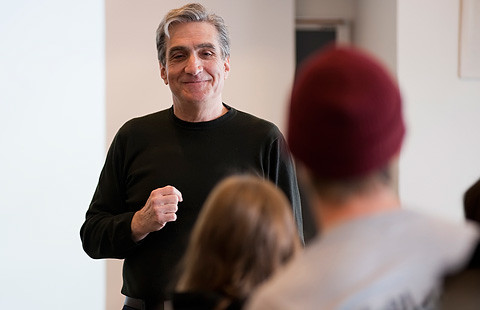When Robert Pinsky, former poet laureate of the United States and founder of the Favorite Poem Project, opened the floor to questions during Thursday’s lunchtime talk with students, he promised to treat each one with respect. And why wouldn’t he?
At the heart of his belief, shared in his 1984 book Poetry and the World, is that “an artist needs not so much an audience, as to feel a need to answer, a promise to respond.”
But Pinsky, who later quoted a family aphorism — “everything is what it is and the opposite” — is a poet of contradiction.
While one of the most revered and published poets of his generation, he also has found some relatively “low-brow” outlets for his art. In 2002 he read one of his poems on an episode of the animated television series The Simpsons.
“I’m an elitist and a democrat with a small d,” he said.
 |
| Robert Pinsky, former U.S. poet laureate, talks with students Thursday. (Photo by Andy Daddio) |
His Favorite Poem Project attracted some 15,000 essays from Americans of all ages, backgrounds, and walks of life about their favorite works. The outcome was an archive of audio and video recordings.
Between playing a few of the videos, Pinsky recited one of his favorite verses, a two-line poem by Walter Savage Landor.
On love, on grief, on every human thing,
Time sprinkles Lethe’s water with his wing.
|
“The medium for a poem is the reader’s breath,” said Pinsky, taking clear pleasure in the way his teeth and tongue gave life to the vowels and consonants. “By the nature of the medium, poetry is on a human scale.”
Later, at a reading in the Ho Lecture Room, Pinsky talked more about the sound of poetry and about his early ambition to be a jazz musician.
“Standing up here and reading my work is not the culmination of my art, as when a musician plays his song,” he said. “The culmination is when one of you reads one of my poems aloud to yourself, or to a friend.”
Michael Coyle, professor of English and host of a weekly jazz show on WRCU radio, noticed the connection between Pinsky and jazz. “It’s not so much in his words, but in the way he combines things and riffs on things. He has a sensibility about how you can improvise on things and still make them your own.”
Pinsky’s visit to 51łÔąĎÍř was supported in part by the university’s Institute for the Creative and Performing Arts. His most recent collection of poems is Gulf Music: Poems. Currently, he teaches in the graduate writing program at Boston University and is poetry editor for the online magazine, Slate.